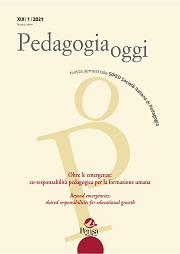“Resilient education”: the schooling system becomes non-formal
DOI :
https://doi.org/10.7346/PO-012021-08Mots-clés :
Children, Resilience, Disparities, Non-formal education, CommunityRésumé
The COVID-19 pandemic has inspired local organizations and associations to experiment with new forms of non-formal education, which can be defined as “resilient” because, notwithstanding the critical issues linked to the state of emergency, they have allowed children and teenagers to express themselves and learn, thus integrating, and sometimes substituting the distance activities proposed by scholastic institutions. This paper therefore pro- poses to reflect upon these forms by analyzing some examples of good practice, so as to direct future educational acts, beyond the context of the emergency, towards a renewed dialectic between formal and non-formal education. Certain themes will hence be brought to the readers’ attention: the relationship between technology and new disparities and poverty, the use of different narrative forms to promote resilience processes and the development of proto-social abilities to construct new, supportive and participatory community models, as the present historical moment requires.




